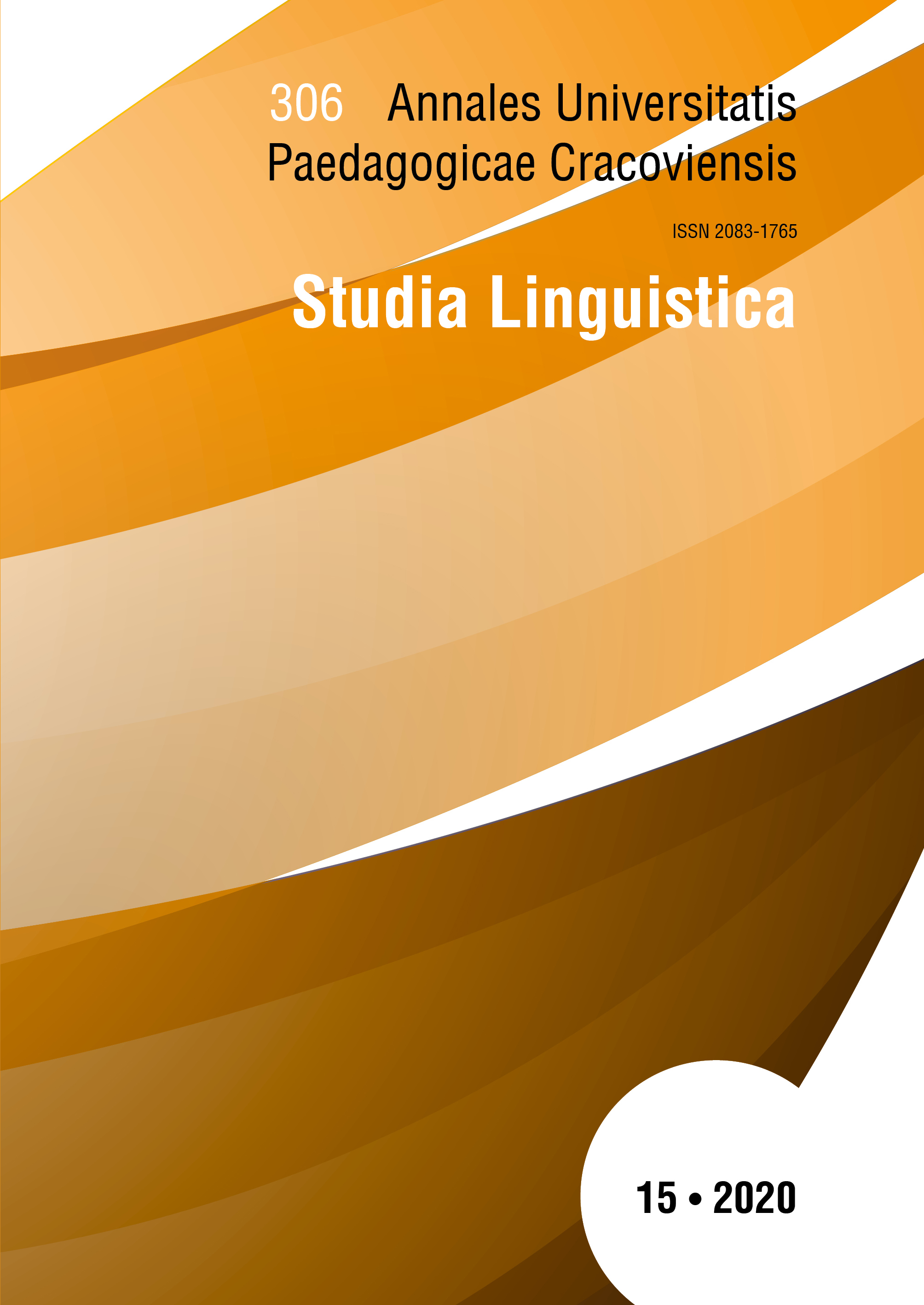KRAKÓW w derywacji onomastycznej
Main Article Content
Abstrakt
The subject of the paper are derivatives of the name Kraków in toponymy and anthroponymy of Polish and some other languages. They form numerous, varied names (local, regional, ethnic, personal). However, they do not contribute much to the explanation of the name of the city, which, in all likelihood, is derived from the name Krak, supposedly a founder. Attention should also be paid to parallel names from the area of Czech type Krakov, Krakovec, Krakovany, which could indicate their common origin.
Downloads
Article Details

Utwór dostępny jest na licencji Creative Commons Uznanie autorstwa – Użycie niekomercyjne – Bez utworów zależnych 4.0 Międzynarodowe.
Autor, zgłaszając tekst do redakcji czasopisma „Annales Universitatis Paedagogicae Cracoviensis. Studia Linguistica”, zaświadcza, iż jest on rezultatem wyłącznie jego własnej twórczości, że treść artykułu nie była dotychczas publikowana oraz że utwór nie narusza w żadnym stopniu praw autorskich ani praw pokrewnych innych osób, jak również innych praw osób trzecich, a także, że niczyje prawa do utworu (lub jego jakiejkolwiek części) nie zostały pominięte. Po podpisaniu umowy prawa majątkowe do opublikowanych materiałów zostają przeniesione na Uniwersytet Komisji Edukacji Narodowej w Krakowie.
Rocznik „Annales Universitatis Paedagogicae Cracoviensis. Studia Linguistica” to czasopismo o otwartym dostępie, a cała jego zawartość jest udostępniana bezpłatnie dla użytkowników i instytucji na zasadach licencji Creative Commons CC-BY-NC-ND 4.0 (uznanie autorstwa, użycie niekomercyjne, bez utworów zależnych). Na podstawie tej licencji autorzy zgadzają się, że ich prace mogą być zgodnie z prawem ponownie wykorzystywane do jakichkolwiek celów, za wyjątkiem celów komercyjnych, bez konieczności uzyskania uprzedniej zgody ze strony autora lub wydawcy. Każdy może prace te czytać, pobierać, kopiować, drukować, rozpowszechniać oraz przetwarzać, pod warunkiem poprawnego oznaczenia autorstwa oraz oryginalnego miejsca publikacji. Publikowanych tekstów nie można wykorzystywać do tworzenia utworów zależnych (np. do tłumaczenia ich i publikowania w innym języku bez zgody wydawcy). Jest to zgodne z definicją otwartego dostępu BOAI (Budapest Open Access Initiative) „Studia Linguistica”nie pobiera opłat za składanie artykułów ani ich przetwarzanie.
Autor, przesyłając artykuł do redakcji „Studia Linguistica”, bezwględnie zgadza się z poniższymi punktami:
-
Oświadczam, że jestem Autorem lub Współautorem nadesłanego tekstu. Przesłany tekst nie był nigdzie publikowany, jest całkowicie oryginalny i nie narusza w żadnym stopniu praw autorskich ani praw pokrewnych innych osób, jak również innych praw osób trzecich, a także, że niczyje prawa do utworu nie zostały pominięte.
-
Oświadczam, że nadesłany tekst nie został złożony do recenzji lub/i publikacji w innym czasopiśmie.
-
Przyjmuję do wiadomości, że Autor ponosi pełną odpowiedzialność za każdy przypadek plagiatu, niezależnie od tego, czy został on wykryty podczas procesu recenzji, czy po publikacji w „Studia Linguistica”.
-
Oświadczam, że ponoszę pełną odpowiedzialność finansową i prawną za wszelkie roszczenia związane z utworem.
-
Potwierdzam uznanie wszystkich źródeł danych wykorzystanych i cytowanych w badaniach.
-
Potwierdzam, że artykuł został wykonany z należytą starannością zgodnie ze standardami edytorskimi „Studia Linguistica”.
Bibliografia
Cieślikowa A. (red.), 2006–2016, Antroponimia Polski od XVI do końca XVIII wieku, Kraków.
Google Scholar
Gil G., 1997, Kopce na ziemiach Polski. Od pradziejów po kopiec w Pierzchowcu, Kraków.
Google Scholar
Gedanopedia. Internetowa encyklopedia Gdańska: www.gedanopedia.pl
Google Scholar
Ochmann D., Pałka P., Kwaśnicka-Janowicz A., 2018, Krakus, krakauer, krakowianin i krakowiak – nazwy mieszkańca Krakowa a jego auto- i heterostereotyp, „Język Polski” XCVIII, nr 3, s. 31–48.
Google Scholar
Profous A., 1947–1960, Místní jména v Čechách – jejich vznik, původní význam a změny, t. 1–5, Praha.
Google Scholar
Rudnicka-Fira E., 2004, Antroponimia Krakowa od XVI do XVIII wieku, Katowice.
Google Scholar
Rudnicka-Fira E., 2013, Imiennictwo krakowian od XVI do XVIII wieku na tle historii i kultury, Kraków.
Google Scholar
Rymut K., 1999–2001, Nazwiska Polaków. Słownik historyczno-etymologiczny, t. 1–2, Kraków.
Google Scholar
Rymut K., 2003, Słownik nazwisk używanych w Polsce na początku XXI wieku, Kraków.
Google Scholar
Tyrpa A., 2016, Kraków w gwarach i folklorze, „Polonica” XXXVI, s. 167–180.
Google Scholar
Vanagas A. (red.), 1985–1989, Lietuviu pavardžiu žodynas, t. 1–2, Vilnius.
Google Scholar
